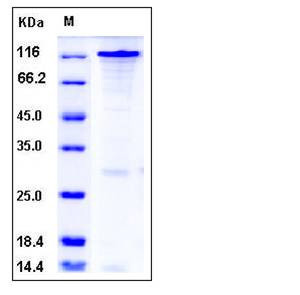Human SRPK1 Protein (His & GST Tag)
RP3-422H11.1,SFRSK1
- 100ug (NPP4289) Please inquiry
| Catalog Number | P12249-H20B |
|---|---|
| Organism Species | Human |
| Host | Baculovirus-Insect Cells |
| Synonyms | RP3-422H11.1,SFRSK1 |
| Molecular Weight | The recombinant human SRPK1/GST chimera consists of 892 amino acids and has a calculated molecular mass of 102 kDa. It migrates as an approximately 120 kDa band in SDS-PAGE under reducing conditions. |
| predicted N | Met |
| SDS-PAGE |  |
| Purity | > 80 % as determined by SDS-PAGE |
| Protein Construction | A DNA sequence encoding the human SRPK1 (AAH38292.1) (Glu 2-Ser 655) was fused with the N-terminal polyhistidine-tagged GST tag at the N-terminus. |
| Bio-activity | No Kinase Activity |
| Research Area | Signaling |Signal Transduction |Protein Kinase |Intracellular Kinase |Serine/Arginine-Rich Splicing Factor Kinase (SRPK) |
| Formulation | Lyophilized from sterile 20mM Tris, 500mM NaCl, 2mM GSH, 10% gly, pH 7.4 1. Normally 5 % - 8 % trehalose and mannitol are added as protectants before lyophilization. Specific concentrations are included in the hardcopy of COA. |
| Background | Serine / threonine-protein kinase SRPK1, also known as SFRS protein kinase 1, Serine/arginine-rich protein-specific kinase 1, SR-protein-specific kinase 1 and SRPK1, is a cytoplasm and nucleus protein which belongs to the protein kinase superfamily and CMGC Ser/Thr protein kinase family. Isoform 2 of SRPK1 is predominantly expressed in the testis but is also present at lower levels in heart, ovary, small intestine, liver, kidney, pancreas and skeletal muscle. Isoform 1 of SRPK1 is only seen in the testis, at lower levels than isoform 2. SRPK1 hyperphosphorylates RS domain-containing proteins such as SFRS1, SFRS2 and ZRSR2 on serine residues during metaphase but at lower levels during interphase. SRPK1 plays a central role in the regulatory network for splicing, controlling the intranuclear distribution of splicing factors in interphase cells and the reorganization of nuclear speckles during mitosis. SRPK1 locks onto SFRS1 to form a stable complex and processively phosphorylates the RS domain. SRPK1 appears to mediate HBV core protein phosphorylation which is a prerequisite for pregenomic RNA encapsidation into viral capsids. |
| Reference |
